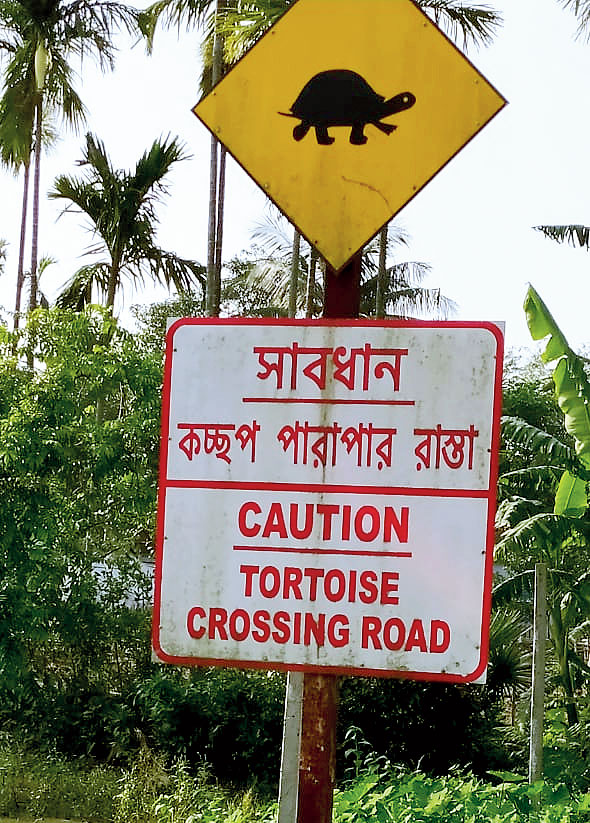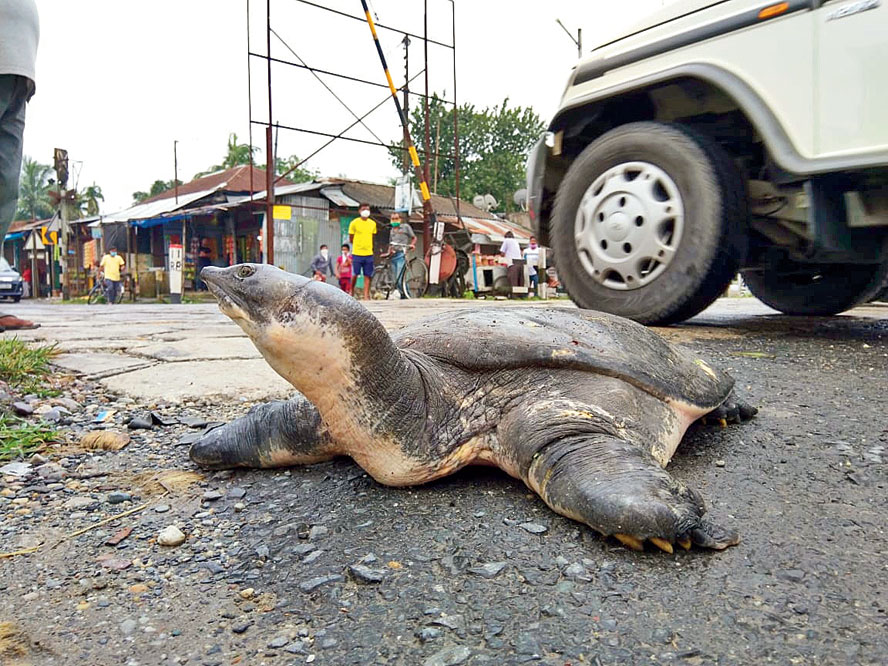A turtle, belonging to a species believed to be extinct in the wild, was crushed by a “staff train” ferrying railway personnel in Cooch Behar on June 9.
A wildlife researcher identified the victim as an adult black softshell turtle — Nilssonia nigricans — currently classified as “extinct in the wild” by the International Union for Conservation of Nature (IUCN).
The accident
The turtle was killed near a level crossing in Baneshwar, around 13km from Cooch Behar town, between 10.30am and 11am on June 9, said residents and animal lovers. The turtle was crossing the railway tracks when some residents spotted it.
“They tried to lift it across the tracks. But they fled after seeing the fast-approaching train,” said Ardhendu Banik, a resident and wildlife enthusiast, who spoke to witnesses after the accident.
The turtle was flung in the air and it landed 20m away after being hit by the train. Shell cracked and the body mutilated, it is said to have lived for around 30 more minutes.
The train was a “staff carriage” with an engine and two coaches, said the spokesperson for North Frontier Railway (NFR).
Past and present
In 2002, the IUCN had listed black softshell turtle as “extinct in the wild”. The turtles used to thrive in the Brahmaputra plains but rampant poaching dwindled their numbers, a forest official in north Bengal said.
However, a small of number survived in ponds owned by some temples in Assam, triggering a conservation effort that took off in 2012. Jayaditya Purkayastha, from conservation group Good Earth, worked with the temple authorities to ensure that eggs laid by the turtles were taken to the state zoo for hatching.
Over the past few years, hundreds of black softshell turtles hatched at the zoo were released into Assam’s Pobitora Wildlife Sanctuary.
“A small number of black softshell turtles are also found in Baneshwar,” said wildlife biologist Shailendra Singh, who heads the Turtle Survival Alliance in India.

A signboard on the Alipurduar-Cooch Behar highway warns about turtles crossing the road
Their primary habitat was a temple pond near Baneshwar station, he said. Local legend has it that the turtles were sent as part of wedding gifts from a royal family in Assam to the royal family of Cooch Behar centuries ago.
“There are around 300 such adult animals in Baneshwar. During the monsoon, when the water bodies are flooded, some turtles move from one pond to another. This animal was probably doing the same,” he told Metro over the phone.
Residents of the area worship the turtles as a reincarnation of Vishnu, said Banik. The black softshell turtles found in India and Bangladesh total “around 700”, said Singh.
Planning after accident
When this newspaper called up the divisional forest officer in Cooch Behar, he said the forest department was “drafting a letter to be sent to the railway authorities” on the accident. The highway between Alipurduar and Cooch Behar has a couple of signboards saying the area is a turtle corridor. There is no such board along the railway tracks.
Designated corridors and speed restrictions — in place across elephant corridors in north Bengal — can help protect the animals, said members of multiple NGOs.
The spokesperson for NFR said the railways had received no intimation from the forest department requesting speed restrictions in the Alipurduar-Cooch Behar line, which passes through Baneshwar.
Ravi Kant Sinha, the chief wildlife warden of the state, said he was unaware of the incident. “We will take it up with the railways as soon as possible,” he said.










